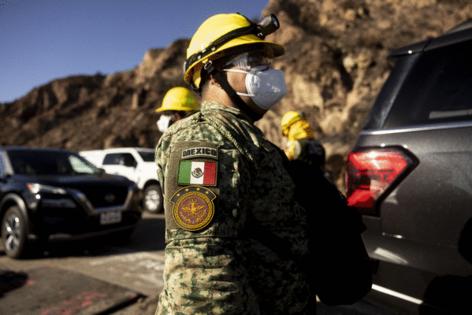Commentary: LA was lucky, with lots of help fighting fires. But no one should count on luck
Published in Op Eds
As bad as the fires in the Los Angeles area have been — more than 12,000 structures burned, about 180,000 people evacuated, more than 35,000 acres scorched, and at least 25 deaths— they could have been even worse. Officials noted they didn’t “ have enough fire personnel … to handle this,” but in some ways we Angelenos got lucky.
American wildland firefighting today is built on a complex network of local, state and federal agencies that are often called to support one another, traveling long distances across state lines to do so. This is how firefighters from neighboring states like Nevada and Arizona can currently be found on the fire lines in L.A., and why the aircraft overhead bear liveries from nearby Orange County and faraway Quebec. North America’s wildland firefighting systems rely on this sort of mutual aid as backup, and it was sheer luck that many agencies — both near and far — had capacity in this moment to spare. As of Tuesday afternoon, when numbers started to slowly decline, there were 5,123 firefighters assigned to the Palisades fire and 3,408 assigned to the Eaton fire, according to status reports.
But a system built on luck is not a durable system. It is already strained, and it risks breaking down in a world of greater and more frequent wildfires.
In the U.S., the federal forces that form the wildland firefighting system’s backbone are the Forest Service and the Bureau of Land Management, along with a handful of smaller agencies. All are overworked, because of a long history of overburdening and underpaying a workforce that is mostly seasonal. Those agencies face deep and constant staffing shortfalls, leading to a wildland fire workforce in America that faces mental and physical health crises and even homelessness.
The better-supported and more stable local and state agencies, by necessity, must focus on their local jurisdictions first. The only reason Orange County can send so much help to L.A. at the moment is that there are currently no large fires burning in Orange County. If Canadian wildfires were burning, we couldn’t have counted on the Quebecois Super Scooper aircraft we see skimming water from the Pacific to fight the Palisades fire.
L.A. County is already home to some of the highest concentrations — and highest quality — of firefighting resources anywhere in the world. More personnel or equipment would not have meant that the Palisades or Eaton fires would have been suppressed in a day or two. Given the severe drought and winds, along with the lack of beneficial natural or prescribed fire in the landscape that has built up what experts refer to as the region’s fire debt, ignitions this month were perhaps destined to cause major fires.
Even if nothing could have stopped those fires, L.A. only narrowly escaped further destruction from numerous new blazes that started after the Palisades and Eaton fires were already burning out of control. As is normal in our current system, additional firefighters from outside the local area arrived to backstop the initial responders when they were exhausted after their 24- or 48-hour shifts. Those relief firefighters helped to ensure new fires didn’t escalate out of control, too.
As a former firefighter myself, I’ve long preached the benefits of the mutual aid and resource-sharing systems. Our world is changing, though, and firefighting tactics must follow. Our firefighting systems are still organized around seasonal staffing surges — but as these January blazes make clear, there is no such thing as a “fire season” anymore.
Land managers, researchers and advocates correctly point to the dire need to reintroduce fire to Western landscapes to repair some of the damage done by more than a century of mismanagement. But prescribed fire in densely populated Altadena or Santa Monica is a tricky task with limited scope. As fires in the so-called wildland-urban interface grow ever more destructive, fighting them is still often the only answer that protects lives and property.
And fighting them requires us to have the workforce to do so. We need that workforce to be stable, year-round and localized. This means exploring options such as perpetual National Guard activations with a focus on firefighting. It might even mean implementing voluntary local or national service models that funnel Americans’ desire to help into these overdrawn and overwhelmed systems. None of this would substitute for the mutual aid we see when communities share resources; those systems should be expanded as well.
Whatever the new system looks like, it can’t just keep doing the same thing we have done every fire season — because if the usual response didn’t work in L.A., it won’t work anywhere.
____
Jay Balagna, a former wildland firefighter, is an assistant policy researcher at the nonprofit, nonpartisan Rand. He lives in Los Angeles near the Eaton fire.
©2025 Los Angeles Times. Visit at latimes.com. Distributed by Tribune Content Agency, LLC.




























































Comments